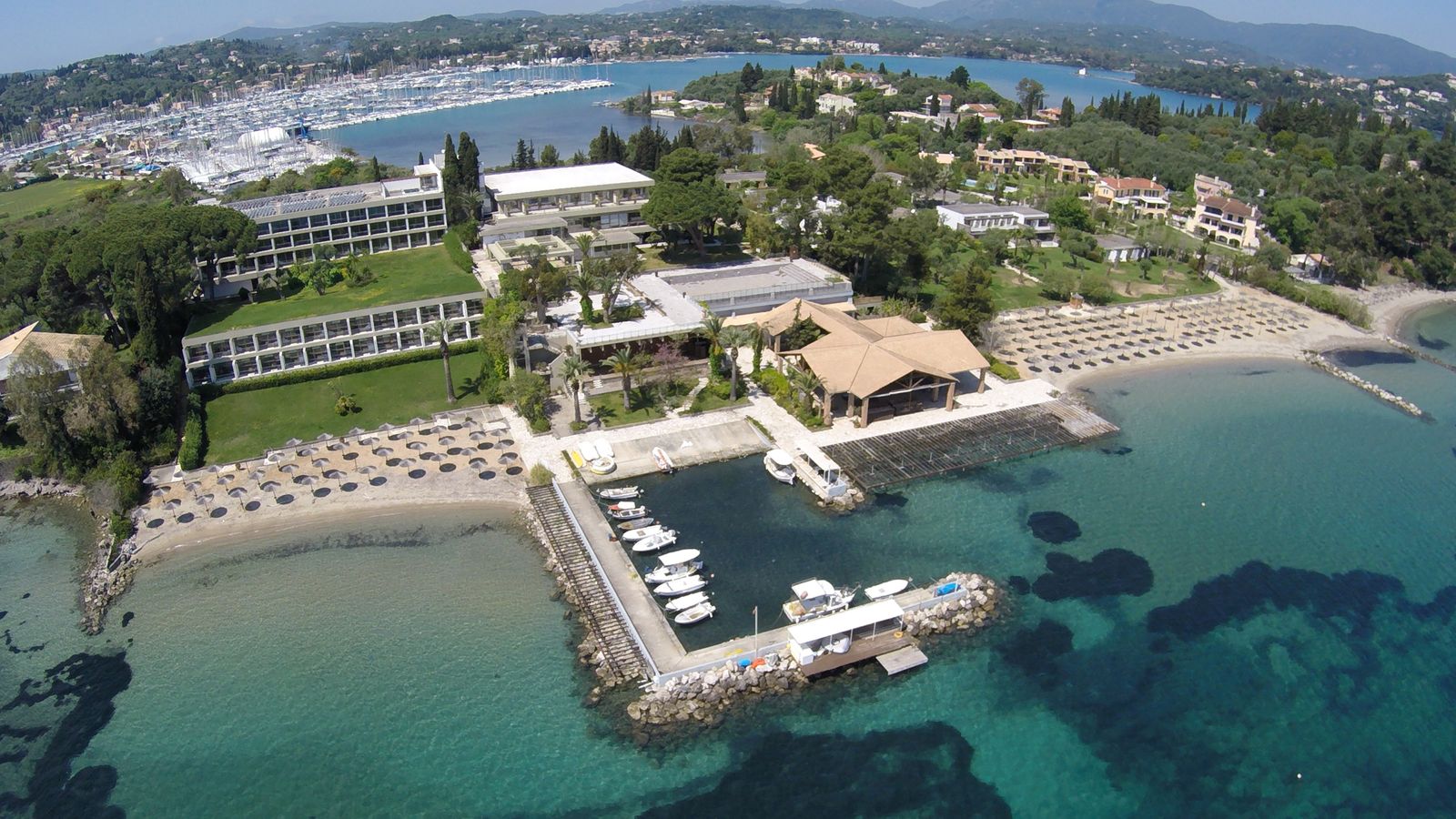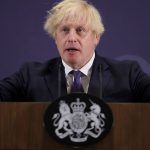Thousands of British holidaymakers have started to fly out the country – with some heading to amber list destinations – as the ban on overseas leisure travel is lifted in England, Wales and most of Scotland.
Travel firms have reported a surge in demand for trips to Portugal, after the government put it on its green list – meaning travellers will not need to self-isolate on their return, and are only required to take one post-arrival COVID-19 test.
However, some passengers catching flights at Gatwick Airport on Monday morning were travelling to amber list destinations – despite ministers warning against travel to amber and red list destinations.
Some companies and organisations have banned staff going to amber and red list countries, Sky News understands.
Live updates as lockdown eased across England, Wales and Scotland
Please use Chrome browser for a more accessible video player
Nathan Priestley, 31, from Wokingham in Berkshire, was heading to Corfu on Monday with five friends.
Asked if he minded having to quarantine after returning to England from the Greek island, he said: “For me, I work from home at the moment so it’s neither here nor there.”
The software sales worker said he had no health concerns over his trip when asked, replying: “I’m still fairly young and fairly active. I haven’t had anything wrong with me, nothing underlying, so for me, a negative test and away you go.”
Health Secretary Matt Hancock told Times Radio on Sunday: “The red and amber list countries are places that you shouldn’t go to unless you have an absolutely compelling reason.”
How the new traffic light system works:
• Green list: This includes Portugal, Gibraltar, Israel, Australia, New Zealand, Singapore, Brunei, Iceland and the Faroe Islands, plus several small remote islands that are British Overseas Territories. Travellers returning from any of these countries do not need to quarantine, and will only be required to take one post-arrival test.
• Amber list: This covers the most popular UK holiday destinations such as Spain, France, Italy and Greece. Transport secretary Grant Shapps has said “you should not be travelling to these places right now”. Those who go against that guidance must take two post-arrival tests, and are also required to self-isolate at home for 10 days, although they can reduce that time if they take an additional negative test on day-five.
• Red list: Brazil, India, South Africa, Turkey, the United Arab Emirates and the Maldives are among the countries on this list. Those returning from a red list country must stay in a quarantine hotel for 11 nights at a cost of £1,750.
Please use Chrome browser for a more accessible video player
Heathrow chief executive John Holland-Kaye told Sky News the airport was relatively “quiet” on Monday morning, and that “not too many people are taking advantage of the changes”, but said it was the start “to get back towards normal”.
He said he hoped to see the green list expand over the next month or so and said the US and Caribbean had similar characteristics to Portugal and there was “no reason why those shouldn’t be opened up this month”.
“Similarly, Greece and Spain, we should see coming on to the green list,” he said, and urged the government to release a list of countries which they foresee being added to the list so people can book their holidays “with confidence” and “know where they stand”.
British Airways boss Sean Doyle, at Heathrow, told Sky’s Ian King Live: “We are running about 79 flights today. If I compare that with the same day two years ago, we would have been over 800 flights.”
EasyJet has added 105,000 extra seats to its flights serving green list destinations, while TUI has said it will be using planes which normally operate long-haul routes to accommodate the increase in bookings to Portugal.
Charlie Cornish, chief executive of Manchester Airports Group which owns and operates Manchester, London Stansted and East Midlands airports, described the relaxation of the rules as a “symbolic moment after the most difficult year in our history”.
Ryanair chief executive Michael O’Leary told Sky’s Ian King Live bookings had trebled in the last six weeks with “very strong flows from the UK to Portugal, Spain, Italy and Greece for June, July and August”.
He said: “There is uncertainty, but that is more near-term… people are looking beyond that. Italy and Greece are on the amber list. There is an expectation I think within the industry that they will be added to the green list before the end of May. Spain might be a little bit later, but it will get there by the end of June.
“So by the time the UK school holidays come round, I think people are, correctly in my view, booking holidays in June, July and August, safe in the knowledge that either they will be vaccinated or that there won’t be many restrictions on them when they return back to the UK.”
He said he had been “very critical of the UK government in its handling of COVID”, but “complimentary also” and hailed an “extraordinarily successful” vaccine rollout.
Sky’s Michelle Clifford said taxi drivers at Faro airport on Portugal’s Algarve were expecting a busy day, with around 20 flights due to arrive with British holidaymakers on board.
“Those working in the Algarve’s tourist industry are delighted,” she said.
“The region has suffered badly in the last year. Brits are the biggest market and their absences has hit hotels, restaurants and bars hard. The hope is that from today things will improve.”
Airlines and tour operators have called for quarantine and testing requirements to be relaxed, and for more destinations to be added to the green list.
However, medical experts have warned there are “broad swathes of Europe that are largely unvaccinated” and are therefore “pretty vulnerable to new variants, be it Indian or otherwise, sweeping across the continent”.
Sir John Bell, Regius Professor of medicine at Oxford University, told Times Radio: “We aren’t at the peak of this thing globally at all yet, we’re still going up the mountain. So having people flying around and coming back with whatever local variant they run into, that is not a good idea in my view.”
Subscribe to the Daily podcast on Apple Podcasts, Google Podcasts, Spotify, Spreaker
Sir Jeremy Farrar, director of the Wellcome Trust, added the variant first identified in India could be transmitted by people travelling out of the UK.
He told BBC Radio 4’s Today programm`e: “Britain is a very connected, and very small country and the chance of local cases becoming regional and then regional becoming national is very clear.
“And it is also connected internationally and I think that’s also a concern not only for importation of new variants coming into the country, but also people travelling out of the country – there is a risk that this variant B.617 could be transmitted from the UK now.”
The government is set to update its traffic light travel list on 7 June, and has said it will review its overall policy in relation to arriving travellers on 28 June.
Most of Scotland moved into tier 2 restrictions from today, meaning international travel is permitted following a similar traffic light system to that in England and Wales. However, Glasgow and Moray remain in tier 3, meaning international travel is not allowed.
Non-essential travel from Northern Ireland to the Common Travel Area – which includes the UK, Republic of Ireland, Channel Islands and Isle of Man – is allowed from 24 May.






















